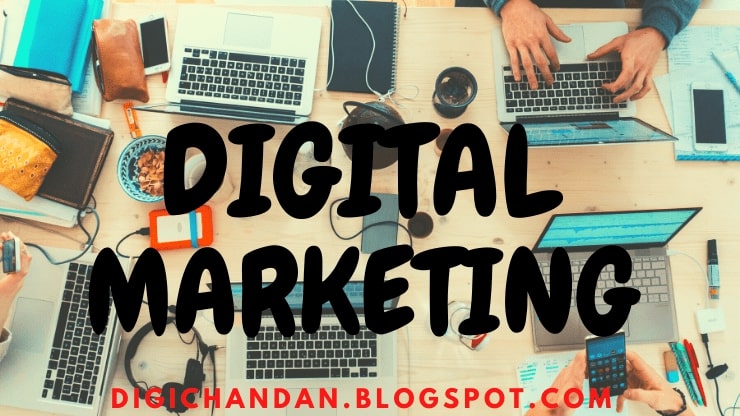Definition of Digital Marketing
Marketing, despite common thinking, it isn’t just a promotional tool. A process for creating, communicating, delivering, exchanging offerings to the customer. It’s essentially the bridge between your organization and your customers. It’s your vehicle to reach the audience to serve and deliver the value you have promised.Marketing teams should be on a mission to constantly develop and improve themselves, striving for the perfection of processes to better serve the customer. For example, combining user behavioral data with your customer e-mail marketing database could improve the marketing messages you serve your prospects, in turn improving campaign response rates and reducing resource wastage in the form of fewer email unsubscribers.
Continuous marketing improvement is needed in fast-developing markets and gives forward-thinking companies an edge over their competitors.
 |
| digichandan.blogspot.com |
Digital marketing encompasses more roles and skills than Traditional marketing, and this is a flexible, versatile nature of the business that makes it so exciting.
To kick start or advance your career it’s a good idea to think about getting training in at least one or two specialty areas unless you’re in or gunning for management, in which case you’ll probably need to know about them all.
Digital marketing means using any electronic media towards the promotion of goods and services. This is a primarily Online-based activity aimed at selling goods or providing services.
Benefits of Digital Marketing
Low cost:-
Marketing via digital platforms offers an alternative to the traditional method. They create as much impact and costing way less.
Huge return of investment:-
Digital marketing offers a substantial return on small investments. Email marketing or running advertising campaigns on social media platforms cost little in comparison to traditional marketing techniques.
Easy to measure:-
you can track how many audiences visit your website, and how many time they spend on your which page or post, you can also know the age group and conversion rate. Google Analytics may be a very effective tool for measuring specific goals to be achieved on an internet site or blog. Google Ads manager allows users to monitor the performance of their ads on Google search; they can know how many people viewed their ads and learn all about their conversion rates.
Easy to Adjust:-
An ad campaign that is performing well, it is easy to invest more in it with just a click. it is often adjusted accordingly or stopped altogether with ease.
Greater engagement:-
your business offers are most likely also being offered by thousands of other businesses. The average bounce rate on websites increased and the attention span of visitors is dropping. When visitors to an internet site don't immediately find what they're trying to find, they leave for an alternate.
Brand development:-
Businesses can use their digital platforms to build their company’s brand and reputation. A well-developed website, useful articles, a social media channel that's highly interactive are several ways by which a business can build its brand.
Easy to share:-
Most digital marketing channels feature sharing capabilities that allow campaigns and articles to be shared with multiple followers. This helps to create a multiplier effect and can tremendously improve sales results.
Precise targeting:-
Marketing on digital platforms allows for targeted campaigning where ads are presented to customers who supported their preferences. Take, as an example, transactional emails (order confirmation emails, receipt, password reset) which can only be sent to customers following their action towards the business.



0 Comments
If you have any doubts, please let me know.